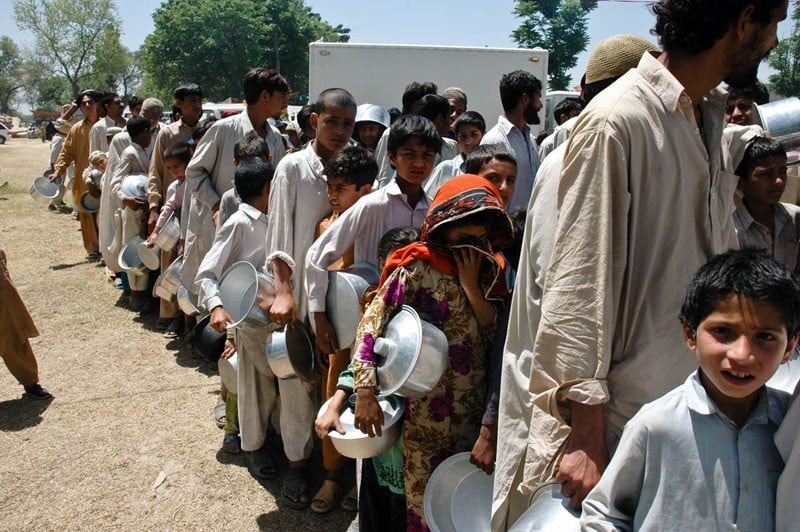
A budget must focus on employment-generating projects to eradicate poverty

Have the federal and provincial budgets 2016-2017 given any positive news to the common man?
A large segment of Pakistan’s population is living below the poverty line. In the month of April 2016, the government released the poverty data after a decade.
According to official sources, around 60 million (29.5 per cent) of Pakistan’s population is living below the poverty line. The new poverty line estimates the number of poor households at 6.8 million to 7.6 million. The last poverty measurement model (2001) was based on food energy intake, this time the government has also incorporated costs of basic needs for capturing non food expenditures. These are included expenditures on education, health and mobile phones.
Every year in June people in Pakistan anxiously wait for the country’s budget. They hope that the upcoming budget may provide them some relief. Sadly, the budget seldom gives them relief.
Maintaining household expenditures for the poor in Pakistan is getting difficult as we have seen rising prices of basic needs in the past few years. In the last year’s budget the government had declared Rs13,000 to be the minimum monthly wages. This year, in the budget 2016-17, the federal government as well as provincial governments have increased 1000 rupees only-- Rs14,000 that is.
In the current scenario, one can hardly make the budget of a household in Rs14,000 a month. Increase in the prices of basic necessities after the imposition of more indirect taxes, electricity tariffs increasing almost every month, children’s education related expenses are also increasing after the tax imposition on stationary items.
If we talk about the Metro Bus Service employees, the lower staff is reportedly getting less than Rs13,000 per month currently. Will the government ensure that their minimum wage is Rs14,000. Not only these employees but other thousands of people who work formally and informally whose wages are less than Rs14,000 per month.
Another step by the government in the budget 2016-17 is an increment of just 10 per cent in the salary of government employees, which has been rejected not only by All Pakistan Clerks Association (APCA) but also by government servants, saying it is very difficult to manage their current expenditures in the salary and it will remain difficult to manage with the increment as well. APCA central chairman, Chaudhary Muhammad Afzal, considered it "a drop in the ocean". According to this increment, the BPS-1 employees will receive Rs1,245 per month.
There are various social safety net programmes operating currently. These are Benazir Income Support Programme (BISP), Pakistan Bait-ul-Mal (PBM), Zakat, Employees Old Age Benefit Institution (EOBI) and Workers Welfare Fund (WWF). Among all these programmes, the main programme is BISP.
This programme was started in 2008 with the objectives to enhance financial capacity of the poor people and their dependents. Last year, Rs102 billion were allocated for this programme. This year, Rs115 billion have been allocated for BISP in the budget 2016-17. Is this programme really helpful in reducing poverty in Pakistan?
News reports suggest that the BISP is not properly functioning. According to a Policy Brief of SDPI, "Social Protection in Pakistan," for BISP there is a need of efficiency of expenditure, targeting of expenditure, and revision of poverty baseline/scorecard.
Given this, it is asserted that BISP, by the very construct of it, does not intend to "alleviate" poverty rather the focus is on "protecting" people from any shocks. The programme aims at "protection" and not "graduation" of the poor. The government needs to come up with alternative programmes which primarily focus on taking out people from poverty.
Looking at the issue broadly, poverty can’t be alleviated by starting programmes like BISP, or giving minor relief to the poor people of the country through political schemes; the poverty can be alleviated through building efficient labour markets which can promote job creation, provision of high quality education opportunities, and health facilities to the youth on a permanent basis.
What needs to be done to eradicate poverty from Pakistanis to focus on providing technical education and invest in employment generating projects, elimination of corruption, reducing the energy crises, and reduction in non-development expenditures.